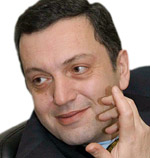– Mr. Adonts, according to your opinion what role may the European Union have in the process of the Karabakh conflict settlement?
– It is worth mentioning that by supporting the settlement of conflicts based on peace and international principles the EU has always been neutral in this process. In all documents adopted between the EU and Armenia the parties refer to the principle of people’s self-determination. A number of documents adopted in the European parliament include provisions about the Karabakh issue as well. In the documents on strengthening the European neighborhood policy and on South Caucasus they discussed the possibility of implementing certain projects in Karabakh by the EU. The EU is not a party of the Minsk Group but it has numerously announced about its commitment to the peaceful settlement of the conflict. The EU supports the negotiations based on the principles of Madrid adopted in November 2007. The EU supports the resolution adopted on November 2 in Moscow as well, as well as the announcement of the OSCE ministers on December 5, 2008. In addition, the EU has agreed to participate in the post-war recovery after the execution of peace agreement between the parties.
– What are the tools and mechanisms the EU may use to make the Karabakh peace process more effective?
– One of the priorities in the EU-Armenia action plan of the European Neighborhood Policy is the support to peaceful settlement of Karabakh conflict. The EU may have a significant role in generating trust between the parties. Our policy is clear; we advocate for reconciliation through cooperation. The EU’s project such as the European neighborhood Policy and Eastern Partnership and the multilateral cooperation contemplated by these projects may establish a platform to develop mutual issue-based cooperation, which will serve a good environment for the settlement of the conflict.
– Do you think the EU may see any connection between the Turkey-Armenia relations and the conflict of Karabakh? What do you think about the current phase of the European Neighborhood Policy implementation in Armenia?
– The development of economic and political relations with the EU is a foreign policy priority. A lot of work has been done for this purpose and there will be a shift in these relations soon. Currently issues such as the EU-Armenia association agreement, agreement on deeper and comprehensive trade relations, simplification of entry visas, humanitarian contacts, substructure projects and a number of other issues are being discussed in the agenda. The European neighborhood policy and Eastern partnership are a ground for such cooperation. Armenia is actively involved in the implementation of these projects. In the first report of the ENP for 2008 and 2009 the EU observed development. As for the other question, I believe there is no connection between the European integration policy and conflict of Karabakh. Certainly the settlement of the conflict will have a positive influence on the policy of the entire region. Even more, the adoption of European values by the countries of the region and development of policies based on such values will support the settlement of the current conflicts.

